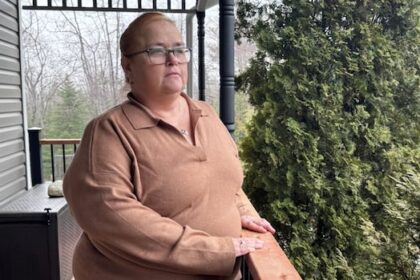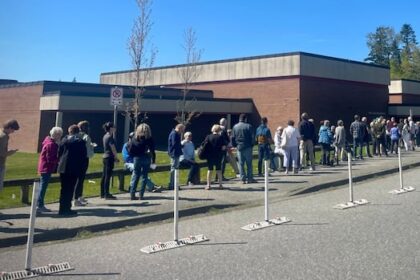British ColumbiaMeasles cases in B.C. make up almost seven per cent of the total in Canada, with the vast majority of them clustered in the province’s northeast, where health officials said the virus spread through a group of unvaccinated families. B.C. cases concentrated in and around Fort St. John in Peace regionLauren Vanderdeen · CBC News · Posted: Nov 10, 2025 5:01 PM EST | Last Updated: 4 hours agoListen to this articleEstimated 5 minutesThe audio version of this article is generated by text-to-speech, a technology based on artificial intelligence.Canada has lost its measles-free status, which one B.C. official says is a result of a reduction in the rate of vaccination. (Aleksandr Finch/Shutterstock)Canada has officially lost its measles elimination status, Health Canada announced Monday, with cases continuing to spread across the country including, notably, in northeast B.C.That’s where all nine of B.C.’s currently active cases are clustered, according to the B.C. Centre for Disease Control’s (BCCDC) latest report. It’s also where 273 of the province’s 360 confirmed and probable measles cases for all of 2025 have come from. Across Canada, B.C.’s total makes up about seven per cent of the more than 5,100 cases reported since the start of the year.Ontario has seen the greatest outbreak with 2,393 cases, followed by Alberta with 1,946 cases.There were 29 new confirmed and probable measles cases reported in B.C. between Oct. 30 and Nov. 6, according to the BCCDC.Dr. Martin Lavoie, B.C.’s deputy provincial health officer, said it’s unfortunate that Canada is no longer measles-free as it’s an easily preventable disease.He said the outbreak peaked around late April this year and has been slowing down across Canada since.”It’s more or less on its way out, and we have yet to see when it’s completely over, but we’re getting closer, that’s for sure,” Lavoie said at a news conference on Monday afternoon.Lavoie noted that the majority of the cases in B.C. have been in the north and 96 per cent of those affected by the cases were not fully immunized.He said many Canadian jurisdictions are dealing with measles due to the same reason.Lavoie acknowledged some religious and cultural communities, among others, have different levels of willingness to engage with the health sectors.”What is important is to offer all the opportunities that we can to engage, to sit down if possible, because they might … have questions, maybe there’s some gap in information.” He said his teams, particularly those in the north, have reached out and held information sessions when possible.He added the good news is that vaccine uptake has been strong over the past six months as people have recognized the risk.Lavoie said vaccines are readily available for both children and adults.Dr. Brian Conway, medical director of the Vancouver Infectious Diseases Centre, said while Canadians have often caught measles abroad, what’s new over the last year is that the disease is being transmitted locally.The loss of the measles-free status should be a wake-up call, Conway said.”This is unfortunate and was completely avoidable,” he said. “This relates to a reduction in the rate of vaccination in Canada.”Conway said the measles vaccination is safe and effective and led to measles being declared eliminated in Canada.”We need to vaccinate. There’s some parts of Canada where the vaccination rate is 50 per cent or perhaps lower. We need to get back to the 80 or 90 per cent that we had for so many years.”WATCH | Canada’s measles outbreak has lasted for more than a year:Canada’s measles-free status revoked, says Health Canada The Pan American Health Organization has notified the Public Health Agency of Canada that Canada no longer holds measles elimination status, says Health Canada. The health agency says that while ‘transmission has slowed recently, the outbreak has persisted for over 12 months.’Conway said measles is “terribly contagious.” In most cases, it is a “very benign disease,” but it can lead to a brain or lung infection or even death, Conway said.He added he hopes next year the country can recover its measles-free status, which would require there being no domestic transmission for 12 months.Most B.C. cases in northeast regionB.C.’s measles cases have been mostly clustered in and around Fort St. John in northeastern B.C.Since an outbreak began in May, 286 confirmed and probable cases have been recorded by Northern Health, according the BCCDC — almost 80 per cent of B.C.’s total 360 cases for the year.There are currently nine active cases in the region.Health officials say the virus continues to spread quickly through unvaccinated families and believe the true number of infections is likely higher than reported.While vaccination rates in the Peace region surged over the summer, they’ve slowed since the start of the school year.In July, Lavoie said a pocket of unvaccinated children in the northeast region has allowed cases of measles to spread “like wildfire.”Multiple exposures were reported in and around Fort St. John, including at an elementary school, emergency room and prenatal clinic.The local school district said earlier this year that the school where the initial measles outbreak took place is 90 per cent Russian- or German-speaking, in an area with religious communities that may not undergo regular vaccine schedules, Measles is also circulating in the Dawson Creek area, according to the BCCDC.A full list of exposure locations can be found here.Around 74 cases have been reported across all other BC. health authorities in 2025, but there are currently no active cases reported outside of northeastern B.C.There have been no measles-associated deaths reported in B.C. this year, according to the BCCDC.ABOUT THE AUTHORLauren Vanderdeen is a web writer for CBC British Columbia. She formerly worked for community newspapers, including the Burnaby Now and New West Record. You can reach her at lauren.vanderdeen@cbc.ca.With files from Andrew Kurjata and Matt Preprost
As Canada loses measles-free status, outbreak in northeast B.C. continues











